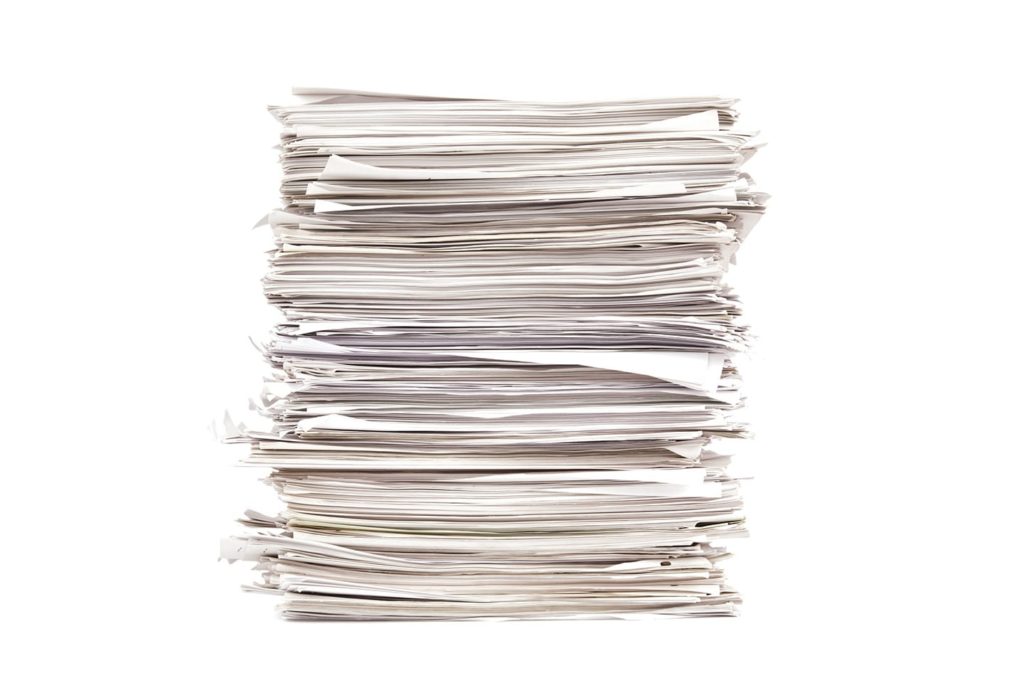Keeping a Well-Organized System
Your files contain important private information that needs to be kept safe – yet easily accessible. Keeping a well-organized filing system is key to reducing stress and saving time and money!
Start Fresh: Trash and Tidy
The first step is trashing all unwanted items and cleaning the area. With important documents, it’s best to shred anything you’re disposing of. Go ahead and wipe down your filing cabinet, clean off your desk, and sort through all the piles of paper you’ve been neglecting for a few weeks.
Choose a Style of File: Digital or Hard Copies


By deciding to go digital, you can save space and reduce clutter tremendously. All you need is a home computer and a scanner. As you scan each document (front and back!), file it into a folder on your computer. Be sure to back up your digital files in multiple places – cloud storage and external hard drives are great options. Digital filing systems are also convenient because they are searchable with keywords, and anything backed up to a cloud is impervious to home disasters like water or fire. Even with a digital system, there will be some essential documents to keep a hard copy of, like birth certificates and passports. These can be filed in a smaller waterproof and fireproof safe that’s easily tucked out of the way.
Many people still prefer to keep a hard copy filing system, and that’s perfectly fine too! When maintaining a physical filing cabinet, tidiness and consistency are key. You’ll want to select a filing cabinet that fits your needs, style, space, and budget – think long term. Choose folders in your preferred colors or have a clear way to identify them. There are countless options for your supplies nowadays, so plan before purchasing.
Create a Custom System: Organizing Your Files
Whether you decide to go digital or keep everything as a hard copy, the next step is planning the organizational system for your files. Digitally, it’s best to create large categories of main folders, then more specific subfolders, and label each document as specifically as possible. Including the date on each document is very helpful when searching similar file types. For a physical cabinet, you can color code the main, large category folders. For example, you may want all tax information in red folders, so you’d have seven red folders labeled with specific years. You could also categorize folders alphabetically, numerically, or a number of other ways. The most important goal when deciding how to organize the files is to choose a system that makes the most sense to you and your family.
Try to avoid miscellaneous files. One large catch-all folder is a nightmare to navigate and also encourages you to do a quick and lazy filing of documents until you can “get to them later.” Miscellaneous files often lead to disorganized systems.
A great way to keep your system (physical or digital!) well-organized is to create and maintain a master list or table of contents of your files. This quick reference tool will help you not only find documents but also help you decide where to file new ones. You’ll be able to see the contents of each folder in one glance, rather than thumbing through each document in its folder or on the computer.
Maintain: Refrain from Paper Piles
Maintaining your filing system is an important, and sometimes challenging, process as we are constantly inundated with new documents. While it may be difficult to sort the mail every day, it’s important to avoid letting it pile up. If you just don’t have the time to go through papers daily, set a day of the week that it must be done – go through the previous week’s papers and file, trash, shred, or take action on the past seven days’ worth of documents. If you’re ever unsure where to file something, check your master list of folders to see which folder’s contents are most compatible.
Lastly, set times throughout the year to do a clean sweep through all files. Eliminate files that are past their relevant timeframe to be saved, and move older folders back or into storage to create room for the new year’s papers.
Keeping an organized filing system can save you stress, time, money, and even legal repercussions. It is very important to keep in organized working order, and you’ll be glad you did!

